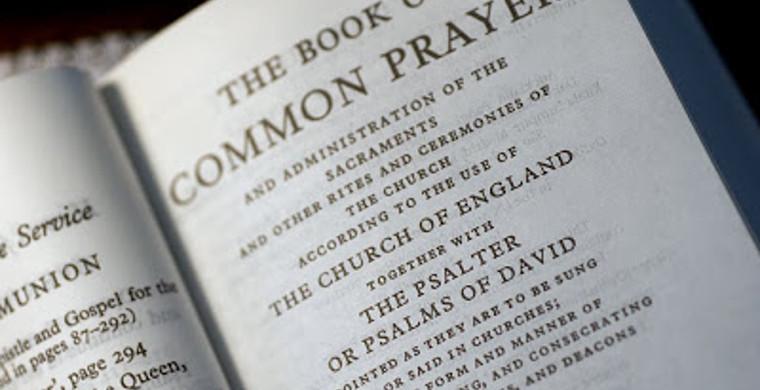THE MARTYRS' STAKE
The Ensign of Reformational Anglicanism
By Roger Salter
Special to VIRTUEONLINE
www.virtueonline.org
February 1, 2018
The constitution of authentic Protestant Anglicanism is defined so faithfully and eloquently in the precious Scriptural content and orthodox historical documents compiled together harmoniously within the 1662 edition of the Book of Common Prayer. This is a volume which clearly attests to the brave and noble biblical and Augustinian nature of our Reformed Catholic stance within the universal Church of God.
Reformational Anglicanism cultivated, and continues to develop, a sound interpretation of revealed theology, a mature spirituality, a worthy tradition of worship, and a disciplined life of communion with God in adoration, gratitude, and service. It seeks to promote as ably as possible the truth and joy of the Gospel of Jesus Christ. The Word of God is the message, the Son of God is mankind's only Savior, and the Holy Spirit is the generator of life with God in the soul of man. The code and creed of Anglicanism is richly Trinitarian (divine self-disclosure), soteriologically monergistic (grace alone), and warmly pastoral (godly care) in its approach to the people it serves within and beyond the bounds of its membership. Principles and practice are carefully derived from Sacred Scripture, as reasonably read and understood, and loyally maintained, hence the triad attributed to Richard Hooker as the basis of ongoing Anglicanism - Scripture, Reason, and Tradition, the combined appeal to the Rule of God through the disclosure of his righteous will, i.e. his government discerned and displayed through revelation, right understanding, and holy obedience.
Doctrine is of the utmost importance, Sacramental ministry nurtures living fellowship with the Lord, Worship expresses a graciously heightened appreciation of the Triune One, and Pastoral concern and tone nourishes, edifies, guides, and guards the believer. These elements are marks of a true (yet imperfect) church and they are commonalities within the reformed family of churches. These features of the faith are traceable in high relief throughout our Cranmerian tradition, a heritage of enormous value and benefit wrought through great human godliness, piety, scholarship, courage, and sacrifice. Our Anglican inheritance is confessionally gratifying to the mind and spiritually satisfying to the soul, but it comes at enormous effort and cost that should increase its infinite worth to us.
In much of our worldwide Communion this inheritance has been forsaken and frittered away. Laxity in strong sound teaching has prevailed resulting in ignorance and indifference toward our historical origins and hard-won convictions. The contrast between constitutional and contemporary Anglicanism, generally speaking, is vast.
Our founders existed within a milieu of menacing threat to personal wellbeing that involved constant harassment, danger, and in many instances the fate of martyrdom. The billowing flame and the blazing stake claimed the lives of saintly men bold in their championing of the Gospel (see J.C. Ryle, Five English Reformers). Heroes of our inheritance died in the period of the Marian monarchy, a time of pyre (Mary's cruel hatred) and Pole [the cardinal's support, the irony of which is Reginald Pole's similarity to both Luther's and cardinal Contarini's doctrine of justification by faith. Pole's ultimate loyalty was to the Church of Rome as was the case with the majority of the members of the Italian spiritual]. What was at stake in the truth of the Gospel for these murdered servants of God defied the terrors of the stake lit by the slaves of error and evil. The words of Hugh Latimer to his fellow bishop Nicholas Ridley, both victims of the Marian persecution and burnings, are famous and oft quoted: Be of good comfort, Master Ridley, and play the man; we shall this day light such a candle, by God's grace, in England, as I trust shall never be put out.
Our Book of Common Prayer enshrines the legacy of our 16th century leaders and their love of Christ and recovery of the way of salvation. The fiery stake of the martyrs is the ensign that summons us to fealty to the faith sealed in bloody torture and the dust of human ashes. We handle a solemn trust to which we are to be entirely and tirelessly true. The relative peace and leisure of our times have caused us to relax our grip and to be seduced or sedated by the preferences (errors, heresies) of false teachers and professional theologians "that do err in their hearts, for they have not known my ways (Psalm 95, Venite). Such swerving from orthodoxy is fueled by fad, fashion, or desire of fame for originality of thought and insight - ambition.
Current Anglicanism is afflicted with the spreading disease of effeteness and it has infected leadership at the highest levels, ecclesiastically, scholarly, ministerially. We have one at the helm whose apologies are serially wrong and apologetics askew. Our era is characterized by mistakes that effectively preclude any danger of the martyr's stake through accommodation to will-worship (notions of human invention) and the world. The convictions and complexities of the Reformation era are misjudged and misconstrued, the dire effects of spiritual struggle hardly comprehended, and in the midst of conflict and provocation, human and satanic, the virtues of many combatants, and courteous attempts at reconciliation on the part of Reformers not recognized. Canterbury ought to know that in contentious issues offenses are inevitable.
Our Reformers "played the man". They knew that the matters they handled affected eternal human destiny. Our contemporary superiors seem to be oblivious to eternity and the priorities of the Gospel as they meddle endlessly in matters of social concern (best handled by competent lay expertise) almost exclusively from their pulpits of enormous privilege before a public that is wasting away through spiritual famine. Our generation is the age of Christian midgets playing with holy things like careless children.
Raise the truth! Unfurl the forgotten ensign!















